Eye Drop Recall – EzriCare Lawsuit
If you’ve experienced adverse effects from EzriCare eye drops, including eye infections or vision loss, our team is here to help. Discover your legal rights and pursue compensation through the EzriCare Lawsuit with expert guidance.
Written by: Sarah from Legal Claim Assistant, Last updated: May 8, 2024
Table of Contents
Information about the Eye Drop Recall from EzriCare
In recent months, a significant health concern has emerged due to the recall of certain eye drops, including those marketed by Ezricare. These products, intended for relieving eye irritation and providing dry eye relief, have been linked to serious adverse events, including eye infections that could lead to partial vision loss. This situation has highlighted the importance of adhering to safe manufacturing practices, especially in critical drug production areas.
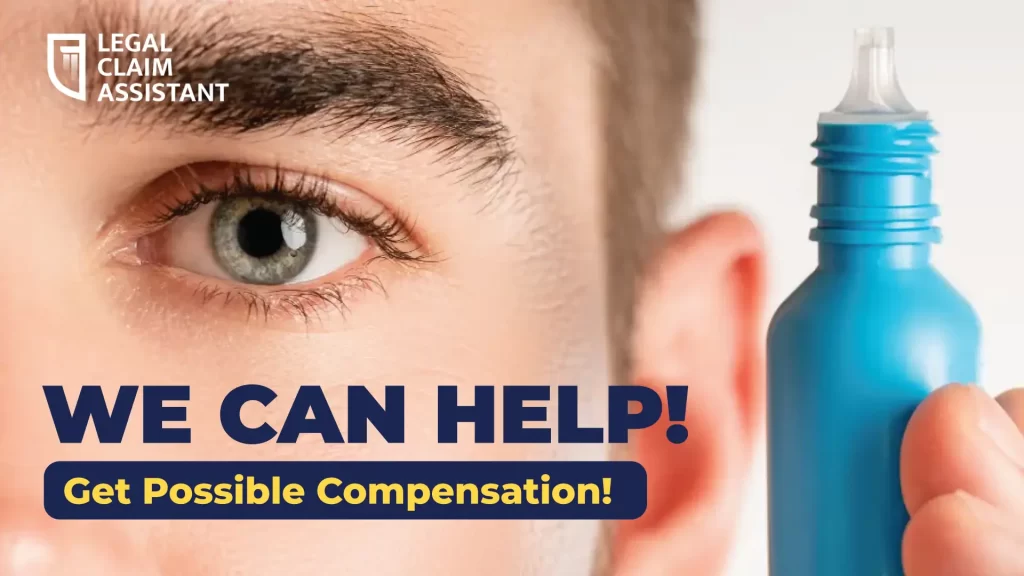
Understanding the Ezricare Lawsuit
Victims of the recalled eye drops, particularly those who have suffered from eye infections or vision loss, are now seeking justice and compensation through the Ezricare lawsuit. This legal action targets the manufacturers, such as Kilitch Healthcare India, and retailers like CVS and Rite Aid, for failing to warn consumers about the potential risks associated with their products.
Need help filing a EzriCare Claim?
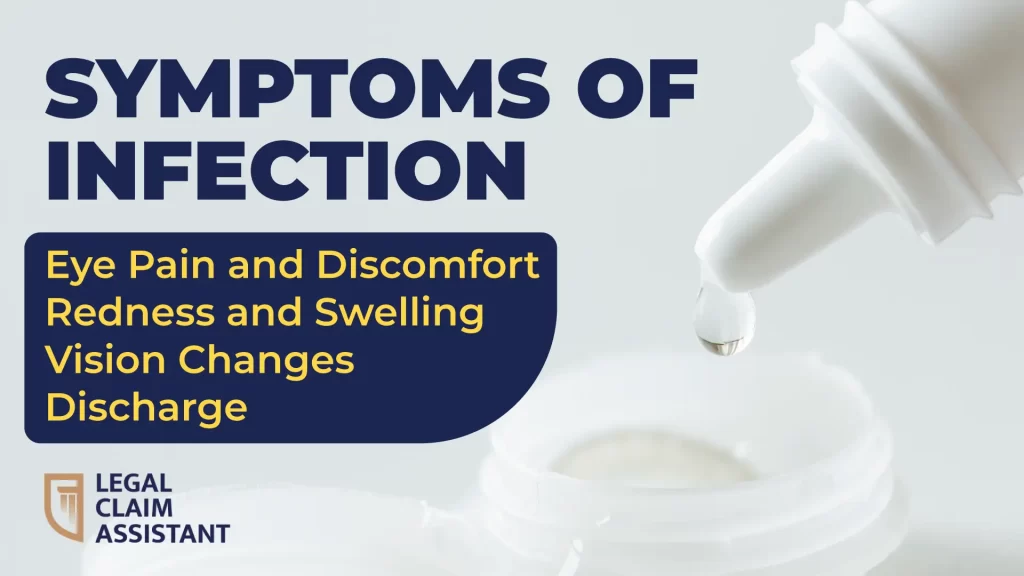
Understanding the Ezricare Lawsuit: What You Need to Know
The Ezricare lawsuit has captured significant attention due to serious health concerns linked to the use of Ezricare eye drops, specifically the artificial tears manufactured by Global Pharma Healthcare. These products, including Ezricare Artificial Tears and Delsam Pharma’s Artificial Tears, have been implicated in numerous reports of severe eye infections, some leading to permanent vision loss.
The core issue revolves around the contamination of these eye drops with a strain of bacteria known as carbapenem-resistant Pseudomonas aeruginosa (CRPA). This bacterium is exceptionally dangerous and resistant to many antibiotics, making infections difficult to treat. The Centers for Disease Control and Prevention (CDC) and local health departments have traced back several cases of serious infections to these contaminated products, prompting a nationwide recall of the affected eye drops.
Victims have experienced symptoms ranging from eye pain and ocular infection to more severe reactions like permanent vision damage and, in extreme cases, the necessity for surgical removal of the eye. These eye drops were supposed to provide relief from discomfort but instead have exposed users to significant health risks, including severe bacterial infections and conditions like pink eye and ocular hypertension.
Key Legal Advice for Filing an Ezricare Eye Drops Lawsuit
If you have suffered from an eye infection or other complications after using Ezricare Artificial Tears or related products, it’s crucial to seek medical attention immediately. Documenting your medical treatment and the specific products used is essential for supporting your case.
Filing an Ezricare eye drops lawsuit involves several critical steps:
Document Everything: Keep all medical records, receipts, and any correspondence related to the eye drops and your treatment.
Report the Incident: Notify your local health departments and the Centers for Disease Control about your infection, especially if it has been confirmed to be caused by CRPA.
Consult with a Lawyer: Speak with nec baby formula lawyers who have expertise in handling cases related to contaminated medical products. These professionals can offer guidance on the nuances of medical product liability and help you understand your legal rights and options.
Consider Joining a Class Action Lawsuit: If there is an ongoing class action lawsuit concerning Ezricare eye drops, joining it could provide a streamlined path to seeking compensation.
Act Quickly: Be aware of the statute of limitations, which can restrict the timeframe within which you can file a lawsuit.
Victims of these contaminated products may be eligible for compensation for medical expenses, pain and suffering, and any long-term care required due to the infection. By pursuing legal action, affected individuals can also help ensure that proper measures are taken to prevent future incidents, promoting safer industry standards and accountability among manufacturers like Global Pharma Healthcare.
The Risks of Using Ezricare Artificial Tears
The use of Ezricare Artificial Tears has been linked to a series of health risks, primarily due to contamination issues that have led to severe eye infections and significant legal actions. Users of these eye drops, including those from Ezricare and Delsam Pharma’s artificial tears, have reported cases of serious eye infections caused by a dangerous bacteria known as carbapenem-resistant Pseudomonas aeruginosa (CRPA). This organism is notorious for its resistance to many antibiotics, complicating treatment efforts and leading to severe complications, including permanent vision loss.
The Centers for Disease Control and Prevention (CDC) and global health authorities have recognized the severity of these infections, which can progress rapidly and require aggressive antibiotic treatment or even surgical removal in extreme cases. The bacterial contamination of Ezricare eye drops has not only raised concerns about the safety and quality controls in place at manufacturing facilities like Global Pharma Healthcare but has also prompted widespread recalls of the contaminated products.
Identifying Symptoms of Infection from Ezricare Eye Drops
If you have used Ezricare Artificial Tears and are experiencing symptoms, it’s crucial to seek medical attention immediately. Symptoms of infection from contaminated eye drops typically include:
Eye Pain and Discomfort: Any persistent or severe pain should be considered a warning sign.
Redness and Swelling: Visible inflammation around the eye.
Discharge: Any unusual discharge from the eyes could be a sign of infection.
Vision Changes: Including blurring and potential vision loss.
These symptoms are indicative of severe eye infections that could potentially lead to permanent vision damage if not treated promptly. Due to the resistance of the bacteria (CRPA) involved, these infections pose a significant challenge and require specific antibiotic treatments that can effectively target the resistant strains.
Victims of these contaminated products are urged to file an Ezricare eye drops lawsuit to seek compensation for medical expenses, pain, suffering, and any permanent injuries sustained. Legal action can also pressure manufacturers to implement stricter safety standards and more rigorous microbial testing to prevent future outbreaks. By understanding these risks and symptoms, users can take proactive steps to protect their health and legal rights.
How Contaminated Eye Drops Can Cause Severe Eye Infections
Contaminated eye drops have emerged as a significant health hazard, particularly highlighted by the Ezricare lawsuit and similar cases involving products like Ezricare Artificial Tears and Delsam Pharma Artificial Tears. These products, found to be contaminated with dangerous bacteria, can lead to severe and sometimes life-threatening infections. Bacterial contamination in these products, often due to inadequate sterilization processes at manufacturing facilities such as Global Pharma Healthcare, can introduce harmful pathogens like Pseudomonas aeruginosa directly into the eye. This specific bacterium is known for its resistance to antibiotics, making infections difficult to treat and increasing the risk of severe complications.
When individuals use these contaminated eye drops, the bacteria can invade the eye and its surrounding tissues, leading to conditions ranging from mild irritation to severe eye infections that could result in permanent vision loss. The severity of these infections depends on the type and amount of bacteria, the individual’s immune response, and how quickly they receive appropriate medical treatment.
Long-Term Health Concerns Associated with Bacterial Eye Infections
The long-term health implications of bacterial eye infections from contaminated eye drops can be dire. In severe cases, infections may lead to chronic eye pain, recurrent infections, and irreversible damage to the ocular structures, resulting in lasting vision impairment or blindness. Conditions like open angle glaucoma can also be exacerbated or precipitated by ongoing inflammation caused by these infections. For those who suffer from severe infections, the requirement for continuous medical monitoring and treatment can become a lifelong burden, emphasizing the need for immediate and effective treatment following exposure to contaminated products.
Steps to Take If You’ve Used Recalled Ezricare Eye Drops
If you discover that you have used Ezricare Artificial Tears or any other recalled eye drops, it’s crucial to take immediate steps to minimize health risks and address any potential legal claims.
Cease Use Immediately: Stop using the product at once to prevent further exposure to harmful bacteria.
Seek Medical Attention: Consult with a healthcare provider as soon as possible, even if no symptoms are present initially. Early intervention can prevent the progression of severe infections.
Report the Issue: Contact local health departments or the Centers for Disease Control and Prevention (CDC) to report the use of the recalled product, contributing to broader efforts to track and manage the outbreak.
Preserve the Evidence: Keep any remaining eye drops and packaging, as they may be crucial for testing and as evidence in a legal claim.
Document Symptoms and Treatment: Record any symptoms related to the eye infection and all medical treatments received. This documentation will be vital for any health insurance claims or legal actions.
Understanding the Recall Process for Ezricare Eye Drops
Understanding the recall process is critical for anyone affected by contaminated eye drops. Recalls are usually initiated by the manufacturer or mandated by health authorities when a product is found to be unsafe. For the Ezricare eye drops recall, information about the specific lots and batches affected is provided by the manufacturer and can be accessed through the FDA’s website or directly from the manufacturer’s announcements. Users should follow the instructions provided for returning the product or disposing of it safely. In the case of Ezricare and similar recalls, health authorities like the FDA and CDC will provide updates and guidelines on how to proceed if you have used the affected products.
Throughout this process, it’s beneficial to consult with Ezricare artificial tears lawyers who specialize in contaminated product lawsuits. They can provide crucial guidance on how to file an Ezricare lawsuit, ensuring that you receive just compensation for any damages or health issues caused by the use of these hazardous products.
Legal Options for Victims of Ezricare Eye Drops
Victims of Ezricare eye drops, who have suffered due to bacterial contamination, have several legal avenues to consider. If you have experienced an eye infection, severe eye infections, or even permanent vision loss after using Ezricare Artificial Tears or similar products from Delsam Pharma, you might be eligible to participate in an Ezricare artificial tears lawsuit. These lawsuits aim to hold Global Pharma and its distributors like Cardinal Health accountable for distributing contaminated eye drops, which have led to serious health issues.
Filing an Ezricare lawsuit can help victims receive compensation for medical bills, loss of quality of life, and other damages related to bacterial infections caused by these products. Legal action can also pressure the manufacturers to implement stricter quality controls to prevent future incidents. Victims should seek legal counsel experienced in handling contaminated product lawsuits, particularly those involving artificial tears eye drops that have led to outbreaks of infections resistant to antibiotics like metallo β-lactamase VIM.
Navigating Medical Care After Using Contaminated Eye Products
After using contaminated Ezricare eye drops, it is crucial to seek medical attention immediately. Inform your healthcare provider about the use of potentially contaminated products, such as Ezricare or Delsam Pharma artificial tears, which could have exposed you to pathogens like Pseudomonas aeruginosa. Early and appropriate medical treatment is vital to manage symptoms and prevent complications such as severe bacterial infections or permanent vision loss.
Patients should follow their doctor’s recommendations for treating the infection, which may include antibiotic treatment that can effectively resist the specific bacteria involved. Additionally, keep detailed records of all medical visits, treatments, and communications regarding your eye condition. This documentation will be essential for your health insurance claims and any legal actions you pursue.
It’s also advisable to report the incident to local health departments and the FDA to contribute to the broader efforts in tracking and managing the outbreak associated with these contaminated eye drops. By taking these steps, you can ensure that you receive the necessary care and contribute to preventing further infections linked to Ezricare Artificial Tears and similar products.
What Is Pseudomonas Aeruginosa and Its Role in Eye Infections?
Pseudomonas aeruginosa is a type of bacteria known for its resistance to antibiotics and its role in causing severe infections, including eye infections. This pathogen can lead to serious health issues when it contaminates environments or products such as eye drops. In the context of the Ezricare lawsuit, Pseudomonas aeruginosa found in contaminated Ezricare Artificial Tears has been linked to numerous cases of severe eye infections. These infections can rapidly lead to permanent vision loss if not treated promptly and effectively.
The danger of Pseudomonas aeruginosa in eye products lies in its ability to resist conventional antibiotic treatments, which makes managing these infections challenging. Medical attention must be sought immediately if an infection is suspected, especially after using products like Ezricare eye drops or Delsam Pharma’s artificial tears, which have been recalled due to potential bacterial contamination. Treatment often requires targeted antibiotic therapy designed to combat specific strains resistant to standard antibiotics.
The Role of Global Pharma Healthcare in the Ezricare Controversy
Global Pharma Healthcare has come under scrutiny in the Ezricare controversy due to its role as the manufacturer of the contaminated eye drops. Investigations have revealed that inadequate microbial testing and oversight at Global Pharma Healthcare’s facilities contributed to the release of eye drops contaminated with dangerous bacteria. The Ezricare Artificial Tears, branded under both Ezricare and Delsam Pharma, were among the products affected.
This lapse has prompted significant legal and health actions, including a voluntary recall of the impacted products and a reevaluation of safety protocols at Global Pharma Healthcare factories. The company’s response and subsequent steps to address these safety concerns are critical in restoring trust and ensuring the safety of future products. Local health departments and global health authorities are closely monitoring the situation to prevent further incidents of contamination.
Class Action Lawsuit Developments: Ezricare Artificial Tears
The class action lawsuit involving Ezricare Artificial Tears has seen significant developments as more individuals come forward having suffered serious eye infections and permanent vision loss due to the use of contaminated products. The lawsuit alleges that Global Pharma Healthcare and its distributors failed to ensure the safety and quality of their artificial tears products, leading to widespread bacterial infections among users.
Victims are seeking compensation for medical treatments, loss of sight, and other damages related to their infections. The class action format allows for a unified, efficient legal proceeding, representing multiple victims who have experienced similar harm from the same product. This lawsuit emphasizes the need for rigorous safety standards and accountability in the production and distribution of medical products like eye drops.
As the legal battle unfolds, the outcomes of the Ezricare class action lawsuit could set precedents for how similar cases are handled in the future and push for stricter regulatory measures in the pharmaceutical manufacturing industry. Affected users continue to seek medical attention and legal advice, hoping for justice and measures that will prevent such occurrences in the future.
The Role of FDA in the Recall Process
The FDA has played a crucial role in addressing this health crisis by warning consumers not to purchase or use eye drops from the affected batches. Investigations by FDA investigators into the manufacturing facility revealed positive bacterial test results and unsanitary conditions, prompting a voluntary recall of the eye drops.
Legal Options for Affected Consumers
Affected consumers of the eye drop recall, especially those experiencing eye infections or partial vision loss from products like artificial tears sold by CVS, Rite Aid, and other eye drop retailers, have legal options. The recall, prompted by risks of eye infections linked to products from Kilitch Healthcare India Limited and others, underscores the importance of consulting with a lawyer for an Ezricare lawsuit. If you’ve used recalled lubricant eye ointments or drops and suffered adverse events, seeking legal advice can help you understand your rights to compensation for harm caused by these defective products. The FDA warns consumers about the potential risk, emphasizing the urgency to immediately stop using affected products and contact an eye care provider for guidance.
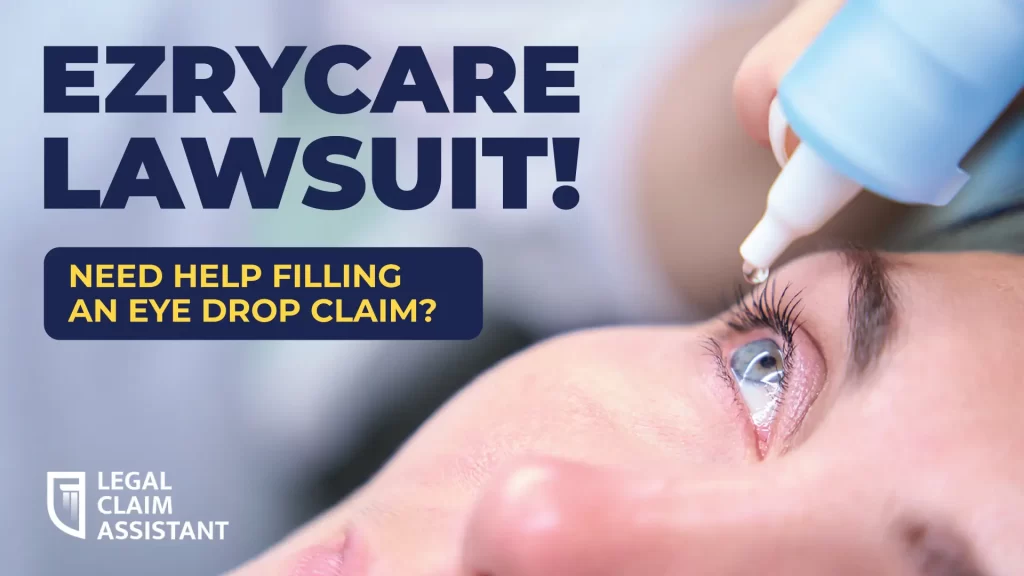
The Importance of Reporting Adverse Events
Reporting adverse events following an eye drop recall is crucial for consumer safety and disease control. Whether it’s a mild irritation or more severe eye infections from products like CVS Health’s lubricating eye or Rite Aid’s triple pack carboxymethylcellulose sodium eye drops, notifying health authorities helps monitor the risk of eye infections widely. It supports the FDA’s efforts in warning consumers about recalled products, ensuring public health is safeguarded against potential risks from defective eye drops, including those leading to an Ezricare lawsuit.
How to Protect Yourself from Recalled Eye Drops
To protect yourself from recalled eye drops and mitigate the risk of eye infection, always check the expiration date and recall notices before use. Be vigilant of products sold at CVS, Rite Aid, and by Cardinal Health, especially if they’re for dry eye relief or as a mild moderate lubricating eye solution. The FDA is warning consumers about certain eye drops recalled due to potential risks, including those from the Harvard Drug Group and Velocity Pharma. Look for advisories on lubricant eye ointments and polyvinyl alcohol eye solutions. In case of adverse reactions, immediately stop using the product and consult with an eye care provider. Being informed can shield you from potential eye infections that could lead to severe conditions like vision loss or blindness, and it’s a crucial step if considering an Ezricare lawsuit.
Find out how much your eye drop recall payout could be:
FAQ on Ezricare Eye Drop Recall Lawsuit
What is the Ezricare eye drop recall? The recall involves specific batches of Ezricare eye drops linked to adverse events, including eye infections and potential vision loss, due to contamination and unsafe manufacturing practices.
Why were Ezricare eye drops recalled? Ezricare eye drops were recalled following FDA investigations that revealed unsanitary conditions in the manufacturing facility, leading to a significant risk of eye infections among users.
Can I file a lawsuit if I’ve been affected by Ezricare eye drops? Yes, if you’ve suffered an eye infection or other adverse effects after using the recalled Ezricare eye drops, you may be eligible to file a birth injury lawsuit against the manufacturers and retailers for compensation.
What can I recover from an Ezricare lawsuit? Plaintiffs may seek compensation for medical expenses, pain and suffering, loss of income, and punitive damages related to the adverse effects experienced from using the defective product.
How do I know if I’m affected by the recall? Check your eye drop packaging for the brand name, batch numbers, and expiration dates listed in the recall notice. If your product matches, cease use immediately and consult a healthcare provider.
Should I consult a lawyer for an Ezricare eye drop lawsuit? Yes, consulting with an experienced birth injury attorney specializing in medical malpractice and product liability cases can provide you with the legal guidance and support needed to pursue a claim.
Is there a deadline to file an Ezricare lawsuit? Yes, product liability lawsuits have statutes of limitations that vary by state. Contact a lawyer as soon as possible to ensure your case is filed within the legal timeframe.
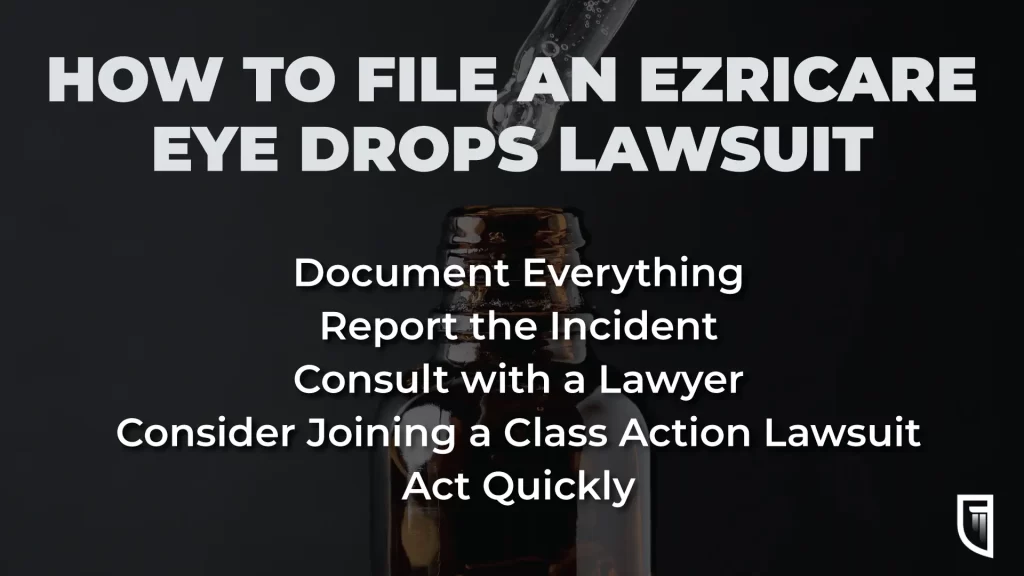
Seeking Compensation: The Path Forward
For those affected by the eye drop recall, including products from Rite Aid and CVS Health, seeking compensation is a crucial step towards recovery, especially if you’ve suffered eye infections or vision loss. If you’ve experienced adverse events from using lubricant eye ointments or carboxymethylcellulose sodium eye drops, it’s essential to understand your rights. Consulting with a lawyer for an Ezricare lawsuit can guide you through the legal process, from documenting your case to navigating FDA findings, like environmental sampling results or identified contaminants like Pseudomonas aeruginosa. An Ezricare lawsuit settlement can offer financial relief for the harm caused, providing compensation for medical treatments required due to defective products, ranging from lubricating eye drops for dry eyes to more severe cases potentially leading to blindness.
Find out if you qualify:
Conclusion: Ensuring Safe Use of Eye Drops
Ensuring the safe use of eye drops is paramount for maintaining eye health and avoiding complications. Always check expiration dates and ensure that products like lubricant eye ointment and propylene glycol eye solutions are stored properly and purchased from reputable sources. Be cautious with products found on store shelves, especially those meant for use with contact lenses or as eye irritation relief. In rare cases, improperly formulated or contaminated eye drops can bypass the body’s natural defenses, leading to potential risks of eye infections. If you suspect that your eye health has been compromised by defective products, consult with a lawyer specializing in the Ezricare eye drops lawsuit or similar legal actions. An Ezricare lawsuit lawyer can provide guidance on seeking compensation through an Ezricare recall lawsuit, ensuring you receive the support and justice you deserve. Remember, vigilance and informed choices are key to protecting your vision and overall well-being.
Legal Rights and Support
Legal Claim Assistant provides crucial support for navigating legal rights related to eye health issues from products like Ezricare artificial tears. Whether it’s a single or twin pack with varying expiration dates or issues with drugs applied, including tetrahydrozoline hydrochloride, we connect you with a lawyer for an Ezricare lawsuit, addressing potential risks of eye damage.
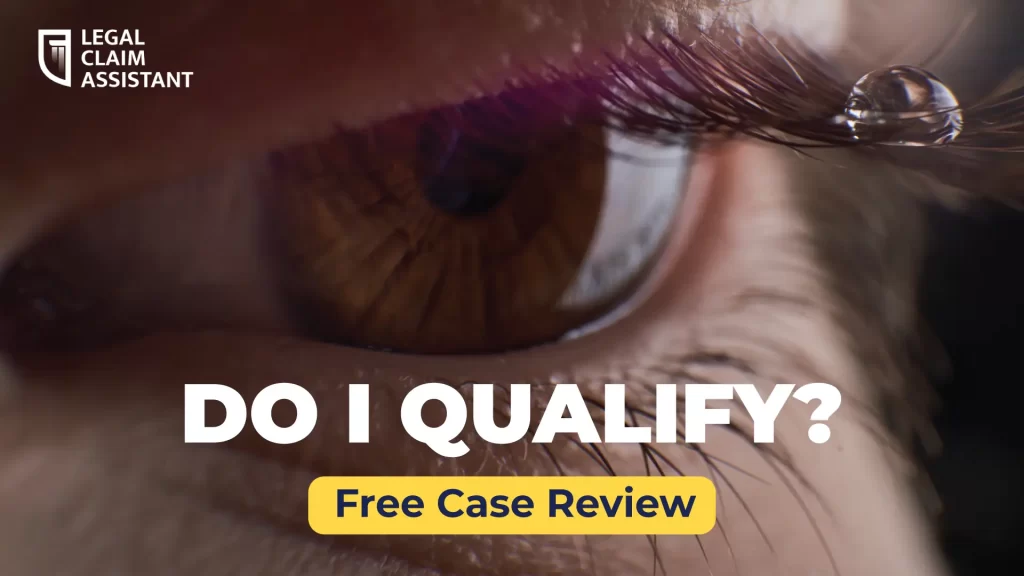
Need help with your Claim?
Written by:
Nicky from LegalClaimAssistant.com
LegalClaimAssistant.com simplifies the process of pursuing legal action. Access information, lawsuit guides, and updates on drugs, products, and other matters that may impact you.
4 References
- Holpuch, Amanda. “Two Army Veterans Awarded $110 Million in 3M Earplug Lawsuit.” The New York Times. January 28, 2022. Retrieved on May 12, 2022 from https://www.nytimes.com/2022/01/28/us/veterans-earplugs- 3m-lawsuit.html
- LexisNexis® Legal Insights. “Product liability & strict liability.” January 06, 2021. Retrieved on May 5, 2022 from https://www.lexisnexis.com/community/insights/legal/b/thought-leadership/posts/understanding-the- interplay-between-strict-liability-and-products-liability
- National Highway Traffic Safety Administration. “Letter to Tesla: Full Self-Driving Software May Cause Crash.” Retrieved from: https://static.nhtsa.gov/odi/rcl/2023/RCAK-23V085-2525.pdf. Accessed on February 17, 2023.
- Unified Parkinson’s Advocacy Council. “Paraquat Dichloride Registration Review.” July 24, 2017. Retrieved on May 12, 2022 from https://files.michaeljfox.org/Paraquat_letter_FINAL.pdf




